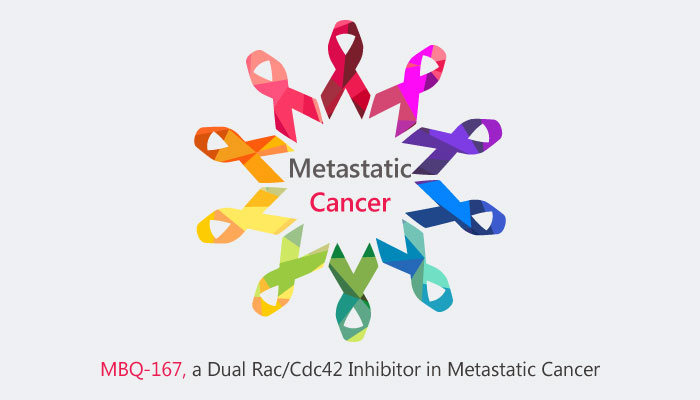Rho GTPases participate in the regulation of cell migration, invasion, apoptosis, cell-to-cell and cell-to-extracellular matrix adhesions. The Rho GTPases Rac and Cdc42 potently induce actin polymerization. In addition, Cdc42 plays a critical role in cell polarity. Increasing studies have identified the effect of hyperactive Rac and Cdc42 on cancer cells. The regulation contains cancer cell survival, migration and proliferation. Therefore, targeting the binding of related receptors to Rac and Cdc42 becomes a rational strategy to inhibit their activation. Fortunately, Both Rac and Cdc42 have been used as drug targets. Although none of the available inhibitors have entered clinical studies.

A study from Tessa Humphries-Bickley, et al. has described the activity of a Rac/Cdc42 inhibitor MBQ-167. In metastatic breast cancer cells, the IC50s of MBQ-167 for Rac 1/2/3 and Cdc42 are 103 nM and 78 nM, respectively. The activity of MBQ-167 was verified both in vitro and in vivo.
In vitro, MBQ-167 (500 nM) treatment for 24 hours resulted in ~95% cell rounding and detachment from the substratum in MDA-MB-231 cells. Moreover, MBQ-167 induced this phenotype in multiple mesenchymal cancer cell types. The various cancer cells include breast cancer cells, pancreatic cancer cells, as well as ovarian cancer cells. Following treatment with MBQ-167 (250 nM) for 24 h, the attached population of MDA-MB-231 cells demonstrated a decrease in Rac activation. However, the detached cells are decreased more.
In vivo, MBQ-167 demonstrated a significant reduction in tumor growth. At sacrifice, Low dosage of MBQ-167 (1.0 mg/kg BW) resulted in a ~80% reduction in tumor growth. In addition, the high dosage (10 mg/kg BW) treatment resulted in ~95% reduction in tumor growth.
To conclude, MBQ-167 shows excellent activities in inhibiting Rac/Cdc42, and has potential to be developed as an anticancer drug.